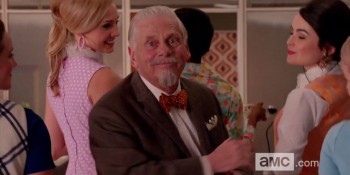A panel of viewers here at Curiata.com will engage in a roundtable discussion following each episode of Mad Men’s seventh and final season. Check back throughout the week for new entries in the series.
Was Bert Cooper sending Don Draper a message from beyond? Is Cooper warning Don against selling his soul to McCann? Or was Don just seeing things? And even if he was, was Don seeing what he needed to see?
This season has been all about building a conflict among the partners of SC&P, and it finally came to a head in the mid-season finale. Jim Cutler made his move against Don and found himself facing opposition from half of the partners, including, surprisingly, Bert Cooper. Cooper was perhaps the most direct with Don about his intentions to force Don to leave the agency, but as Bert explained to Roger Sterling, Don was a member of his team, and he stands by his team. Interestingly, Bert stated that Jim was not part of his team.
Cooper also made it clear that he did not believe Roger was a leader. Bert’s off-the-cuff remarks all season made it pretty clear that he was willing to speak his mind, and his comments toward his longtime partner were likely reflective of his true feelings. As man touched down on the moon, Bert Cooper let go of his ties to the planet, passing away free of the weight of things left unsaid.
Sterling responded to his partner’s death by trying to prove Cooper wrong. Sterling is trying to save Don’s job and restore his own power with the agency by changing it from within. They’ve been bought out before, but Roger believes he can make a better deal this time around. But is making a deal with this rival agency really the way out for Roger and Don?
Perhaps the show-closing song and dance performed by the spirit of Bert Cooper was meant for Roger as well as Don: “The best things in life are free.” Roger will never lose that moment he shared with his grandson, watching humankind reach the moon. Maybe Roger, like Ted Chaough, needs to step away from advertising to reevaluate his life and save himself from the brink of self-destruction. Was Bert showing that he was able to live as long as he did because he maintained a zen-like attitude while his partners and competitors cut throats and lived heavy?
And maybe that’s the entire moral of Matthew Weiner’s masterpiece, boiled down, ironically, into a seven-word catchphrase.
The partners at SC&P are rich, or at least will be. Peggy has risen higher than most women in the 1960s could have dreamed, and she did it before even turning 30. Yet none of them are happy for more than a few moments at a time because there is always another material gain to be had. Roger was always happiest when he was with Joan. Peggy found her greatest relief last week when she and Don finally buried the hatchet and danced together as if father and daughter.
Don has been learning Cooper’s lesson for the past few seasons. If Jon Hamm’s acting is any indication, the happiest Don has been throughout the entirety of the show was when his kids made him feel vindicated: when Bobby made him cry from his selflessness on the night of the Martin Luther King assassination, and when Sally told Don that she loved him. In those moments, we were able to see Don Draper as the caring, good man that he is deep down.
Perhaps the best things in life are free. Whether it’s that one moment when the entire world is watching as man lands on the moon, or that kiss from a pretty girl that you could have never expected. Mad Men is telling us to go out and enjoy the world. Don’t let work consume you, or your life may lead to an abrupt stop at the end of a rope, in the wreckage of a crashed plane, or on the pavement of Madison Avenue.
